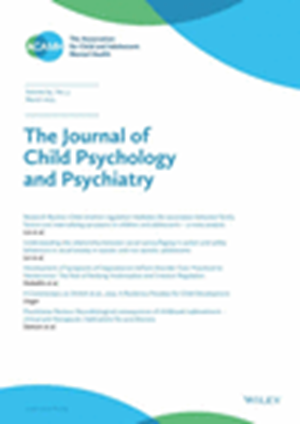青少年期焦虑的严重程度与睡眠后负面记忆的泛化程度相关
IF 7
1区 医学
Q1 PSYCHIATRY
引用次数: 0
摘要
背景:睡眠可能会促进情绪信息的优先选择和重新激活以巩固记忆,从而导致焦虑个体的负性过度概括(即消极信息的概括倾向增加)。我们使用睡眠-觉醒设计在焦虑严重程度的范围内研究了情绪记忆的两个方面——识别和概括。我们假设焦虑的严重程度会与睡眠相互作用,以增加对负面刺激的识别和概括。方法:34名受试者(16名女性;平均年龄= 11.4岁,SD = 2.0)在10 - 12小时的睡眠或清醒保持间隔中完成情绪记忆相似性任务,通过活动记录仪和每日日记进行监测。参与者在编码时对图像的效价(消极、中性、积极)进行打分。在识别测试中,他们识别目标(以前见过的图像),诱饵(与目标相似的图像)和箔(新图像)。结果:混合效应模型显示焦虑严重程度(PARS‐6)、效价和组之间存在显著的三方交互作用(b = 0.011, SE = 0.005, p = 0.042)。对于负效价,睡眠组焦虑的影响显著(b = 0.013, p <;.001),但尾流组没有(b = .0004, p = .927),斜率差异显著(b = -。013, p = .020)。睡眠组负斜率显著大于中性组(b =−)。012, p = .002)但非阳性(b = .007, p = .128)。两组中性价的斜率均不显著(均ps >;. 05)。目标识别模型和诱饵识别模型相互作用不显著。结论:我们提供的证据表明,与清醒相比,青少年期焦虑严重程度与睡眠后情绪,特别是负面内容的泛化程度相关。睡眠相关的情绪记忆巩固可能导致负性过度概括,这是焦虑症的一个病因特征,也是一种潜在的改变机制。进一步的研究是有必要的,特别是在敏感的发育时期,如青春期。本文章由计算机程序翻译,如有差异,请以英文原文为准。
Anxiety severity in peri‐adolescents is associated with greater generalization of negative memories following a period of sleep relative to wake
Background: Sleep may facilitate preferential selection and reactivation of emotional information for memory consolidation, contributing to negative overgeneralization (i.e., an increased tendency to generalize negative information) in anxious individuals. We examined two aspects of emotional memory—recognition and generalization—in peri‐adolescents across a spectrum of anxiety severity using a sleep–wake design. We hypothesized that anxiety severity would interact with sleep to increase recognition and generalization of negative stimuli. Methods: Thirty‐four participants (16 females; mean age = 11.4, SD = 2.0) completed an emotional memory similarity task with a 10‐ to 12‐h sleep or wake retention interval, monitored by actigraphy and daily diary. Participants rated the valence (negative, neutral, positive) of images at encoding. During a recognition test, they identified targets (previously seen images), lures (images similar to targets), and foils (new images). Results: A mixed‐effects model showed a significant three‐way interaction between anxiety severity (PARS‐6), valence, and group (b = .011, SE = .005, p = .042). For negative valence, the effect of anxiety was significant in the sleep group (b = .013, p < .001) but not in the wake group (b = .0004, p = .927), with the slopes differing significantly (b = −.013, p = .020). In the sleep group, the negative slope was significantly greater than neutral (b = −.012, p = .002) but not positive (b = .007, p = .128). Slopes for neutral valence were not significant in either group (all p s > .05). Target recognition and lure discrimination interaction models were not significant. Conclusions: We provide evidence that anxiety severity in peri‐adolescents is associated with greater generalization of emotional—particularly negative—content following sleep compared to wakefulness. Sleep‐related emotional memory consolidation may contribute to negative overgeneralization, an etiological feature of anxiety disorders and a potential mechanism of change. Further investigation is warranted, especially during sensitive developmental periods like peri‐adolescence.
求助全文
通过发布文献求助,成功后即可免费获取论文全文。
去求助
来源期刊
CiteScore
13.80
自引率
5.30%
发文量
169
审稿时长
1 months
期刊介绍:
The Journal of Child Psychology and Psychiatry (JCPP) is a highly regarded international publication that focuses on the fields of child and adolescent psychology and psychiatry. It is recognized for publishing top-tier, clinically relevant research across various disciplines related to these areas. JCPP has a broad global readership and covers a diverse range of topics, including:
Epidemiology: Studies on the prevalence and distribution of mental health issues in children and adolescents.
Diagnosis: Research on the identification and classification of childhood disorders.
Treatments: Psychotherapeutic and psychopharmacological interventions for child and adolescent mental health.
Behavior and Cognition: Studies on the behavioral and cognitive aspects of childhood disorders.
Neuroscience and Neurobiology: Research on the neural and biological underpinnings of child mental health.
Genetics: Genetic factors contributing to the development of childhood disorders.
JCPP serves as a platform for integrating empirical research, clinical studies, and high-quality reviews from diverse perspectives, theoretical viewpoints, and disciplines. This interdisciplinary approach is a key feature of the journal, as it fosters a comprehensive understanding of child and adolescent mental health.
The Journal of Child Psychology and Psychiatry is published 12 times a year and is affiliated with the Association for Child and Adolescent Mental Health (ACAMH), which supports the journal's mission to advance knowledge and practice in the field of child and adolescent mental health.

 求助内容:
求助内容: 应助结果提醒方式:
应助结果提醒方式:


